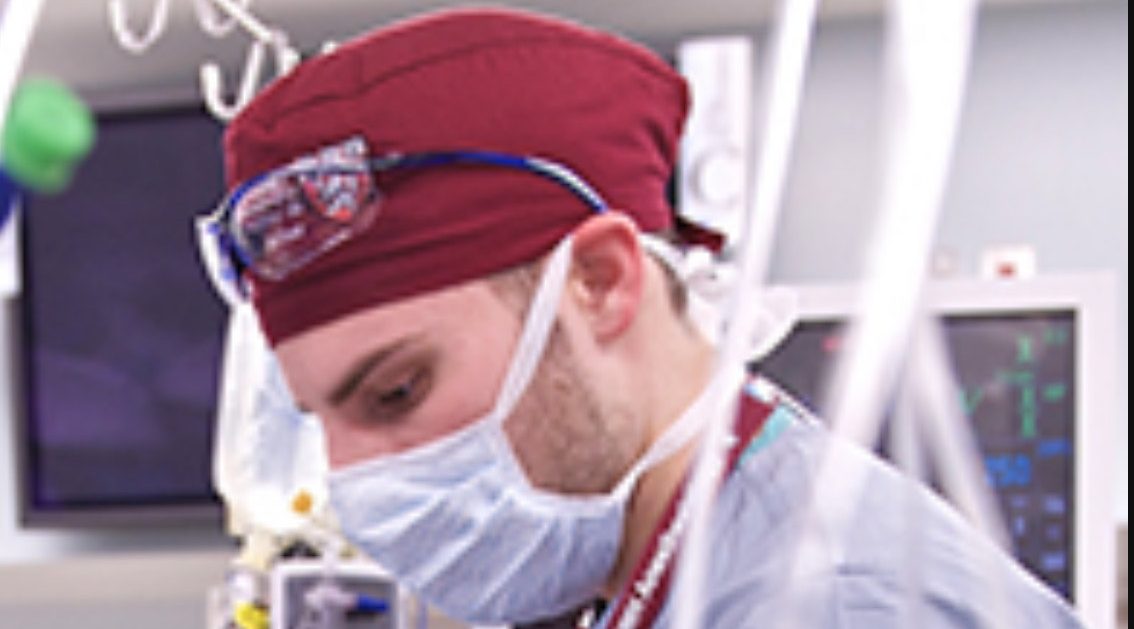Raymond J. Malapero, MD MPH, is a dual board-certified anesthesiologist with more than seven years of experience. He obtained his undergraduate degree in Biological Sciences in 2008 from Rice University. In 2013, he received his Medical Degree from Rutgers New Jersey Medical School. While pursuing his Medical Degree, he completed a Master of Public Health (MPH) with a Concentration in Healthcare Administration in 2012.
Raymond’s internship was at Rutgers – New Jersey Medical School between 2013 and 2014. He completed his anesthesiology residency and adult cardiothoracic anesthesiology fellowship at Harvard University – Brigham & Women’s Hospital in 2017 and 2018, respectively.
Raymond holds American Board of Anesthesiology and National Board of Echocardiography certifications. He also has active New Jersey and Massachusetts medical licenses. He has worked with several medical institutions, serving in different capacities throughout his career, including as a cardiothoracic and liver transplant anesthesiologist, assistant professor, associate residency program director, and chief of cardiothoracic anesthesiology.
Raymond is passionate about his work and performs his tasks with remarkable attention to detail and strict adherence to guidelines and protocols. He is also an accomplished researcher and author with numerous contributions to anesthesiology and the medical field.
Some of his publications include:
- Joint preoperative transthoracic and intraoperative transesophageal echocardiographic assessment of functional mitral regurgitation severity provides better association with long-term mortality.
- Unplanned Reintubation Following Cardiac Surgery: Incidence, Timing, Risk Factors, and Outcomes.
- COVID-19 patients may suffer from proximally displaced endotracheal tubes misdiagnosed as cuff leaks.
- Etomidate derivatives: Novel pharmaceutical agents in anesthesia.
- Efficacy of spinal cord stimulation as an adjunct therapy for chronic refractory angina pectoris.
- An Anesthesia Medication Cost Scorecard — Concepts for Individualized Feedback.
- Remimazolam: Pharmacologic Considerations and Clinical Role in Anesthesiology.
How did you get started in your career?
My career in anesthesiology dates back more than seven years, and began after graduating from medical school and completing my internship at Rutgers – New Jersey Medical School. I have been on an upward trajectory ever since, working with different leading medical institutions in the United States, including Brigham and Women’s Hospital, a teaching hospital of Harvard Medical School. I specialize in anesthesiology, but my sub-specialty is in cardiothoracic anesthesiology.
What is cardiothoracic anesthesiology about?
Cardiothoracic anesthesiology is a subspecialty of anesthesiology that focuses on the preoperative, intraoperative, and postoperative care of patients having cardiothoracic surgery and the related invasive and minimally-invasive procedures. My responsibility as a cardiothoracic anesthesiologist is to provide anesthesia to surgical patients undergoing procedures involving the lungs, heart, aorta and other operations of the chest.
What does the future hold for your career? What are you upbeat about?
I want to ensure more patients receive proper healthcare thus promoting better outcomes and allowing people to get back to their everyday lives quickly. My goal is to lead and work with the healthcare team to provide patients access to the best possible healthcare. I am always motivated by the chance to care for a patient during a complex surgery and to see them through to a successful recovery.
Do you hold any professional certifications?
I am certified by the American Board of Anesthesiology (ABA), which is one of the 24 medical specialty boards that make up the American Board of Medical Specialties. One needs to successfully complete two written examinations, an oral examination, an Objective Standardized Clinical Exam (OSCE), have completed an anesthesiology residency training program, and hold an active medical license to be board certified.
I am also certified by the National Board of Echocardiography. The National Board of Echocardiography was established in 1996 to develop and administer exams and certifications that promote and recognize physician expertise in echocardiography and related fields.
Additionally, I hold an active Massachusetts State Medical License and an active New Jersey State Medical License.
Are you affiliated with any professional body?
I am a member of the American Society of Anesthesiologists (ASA), New Jersey State Society of Anesthesiologists (NJSSA), and Society of Cardiovascular Anesthesiologists (SCA). These are educational, research, and scientific societies with thousands of members focused on raising anesthesiology practice standards and improving patient care.
I am also a member of the American Medical Association (AMA), an organization of American physicians focusing on promoting the science and art of medicine and the betterment of public health.
What books have inspired you in your career?
While I have read many books over the years, I draw inspiration from several places, including family, friends, and colleagues. However, some of the books that have inspired me and I would recommend for aspiring medical professionals include:
- How Doctors Think by Jerome Groopman, M.D.
- Mountains beyond Mountains by Tracy Kidder
- Harrison’s Principles of Internal Medicine authored by J. Larry Jameson, MD, Ph.D., Anthony S. Fauci, MD, Dennis L. Kasper, MD, et al.
Have you written any books or publications?
I graduated my residency at Harvard University – Brigham and Women’s Hospital with a Distinction in Research and have numerous publications. My most recent include:
- Joint preoperative transthoracic and intraoperative transesophageal echocardiographic assessment of functional mitral regurgitation severity provides better association with long-term mortality.
- Unplanned Reintubation Following Cardiac Surgery: Incidence, Timing, Risk Factors, and Outcomes.
- COVID-19 patients may suffer from proximally displaced endotracheal tubes misdiagnosed as cuff leaks.
- Etomidate derivatives: Novel pharmaceutical agents in anesthesia.
What advice would you give to your younger self?
Believe in yourself and stay positive. Things will not always come easily, and you may fail several times before you achieve success. Follow your passion and treat each milestone you achieve as a launchpad to something bigger and better.
What is your favorite quote?
Whatever you do, do it with determination.
Are you willing to be a mentor?
I am always glad to share my knowledge and experience with others, as much as I am willing to learn from those who came before me.

